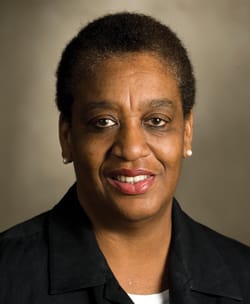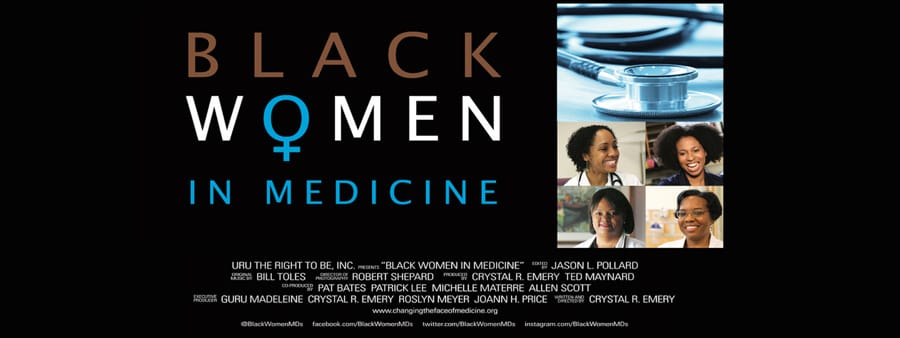Applied Women’s Studies co-sponsoring Sept. 2 premiere of documentary on Black women doctors
At age 3, Kristel Carrington told her mother she wanted to be a doctor. She would consider it “a higher calling.”
Karen Morris-Priester she grew up in government housing, was raised by a single mother, and became pregnant at age 16—she wasn’t supposed to make it. Instead, she became an anesthesiologist.

Linda Perkins
Claudia Thomas was trained to sew as a young girl by her seamstress mother. She recognized her stitching skills were skillful enough to be a surgeon one day.
Such accounts are the focus of Black Women in Medicine, the first documentary to explore the history, issues, and future of African American women physicians from the perspectives of young medical students, elder practitioners, and trailblazing healers.
Claremont Graduate University’s Applied Women’s Studies (AWS) Program is co-sponsoring the September 2 premiere with a screening at Laemmle’s Music Hall Theatre in Beverly Hills. AWS’s sponsorship also coincides with the celebration of the program’s 15th anniversary during the 2016-2017 academic year, with a special event planned for October that will include a keynote speaker, panel discussion, and reception.
Linda Perkins, AWS director and an associate university professor of educational studies and history, will be facilitating a discussion after the September 2 screening.
Perkins is currently completing a book on the history of Black women in higher education.
“This is an important film because it looks at Black women in medicine historically as well as contemporarily,” Perkins said. “It highlights Black women’s role as ‘healers’ during slavery, but it also shows both older Black women physicians as well as younger black women doctors.”
Perkins’ research examines the history of Black women graduates from the “Seven Sisters,” female counterparts to the male-dominated Ivy League colleges. These colleges produced many Black women doctors, including Dr. Claudia Thomas, who graduated from Vassar College before attending The John Hopkins University School of Medicine. She was the first Black women orthopedic surgeon—first taught to sew by her mother.
“I knew I could stitch up a body better than some man who had learned it last week,” Dr. Thomas recalls in the documentary.
Black Women in Medicine also features an interview with Dr. Jocelyn Elders, the first Black women to serve as Surgeon General, and Dr. Marilyn Hughes Gaston, a pediatrician and the first African American woman to head a public health service bureau.
Black women only make up about two percent—or less—of all doctors in the United States, according to the Journal of the National Medical Association and the American Medical Association.

“Medicine was a male and white profession,” Perkins said. “Highlighting the experiences of these women illuminates the obstacles as well as the achievements of these women. The great thing about this documentary is that it portrays a vast array of Black women from all social backgrounds—those who grew up on public assistance in housing projects as well as those who had parents who physicians. They talk about the encouragement they received by their families.”
Black Women in Medicine includes interviews with nearly two-dozen doctors, including:
- Dr. Rashele Yarborough, a graduate of the Yale School of Medicine, discusses how she knew she wanted to be a doctor by age 4. “It was something that I pretty much knew I could do. It wasn’t anything that I thought was unattainable,” she says.
- Dr. Karen Morris-Priester, also a Yale graduate, talks about how she persevered through poverty and teen motherhood. “I was everything people say you’re not supposed to be, every stereotype,” she says. “I was not supposed to make it.”
- Dr. Marilyn Hughes Gaston reveals how she had never met a doctor until she attended college. Noting a lack of role models, the pioneering physician encourages future doctors. “The main thing you have to do is believe in yourself,” she says. “You really have to believe that you can do it. I grew up on The Little Engine that Could: I think I can, I think I can, I think I can.”
The documentary is directed by Crystal R. Emery, the founder and CEO of URU, The Right To Be, Inc., a nonprofit multimedia company, and an award-winning filmmaker and activist. Emery’s 2015 collection of biographical photo essays, Against All Odds: Celebrating Black Women in Medicine, serves as the film’s print companion.
To view a trailer for Black Women in Medicine, click here.